|
|
|
Sort Order |
|
|
|
Items / Page
|
|
|
|
|
|
|
| Srl | Item |
| 1 |
ID:
178867
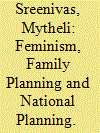

|
|
|
|
|
| Summary/Abstract |
This paper identifies family planning as a key arena of women’s movement activity during the 1950s and early 1960s. Focusing on the All India Women’s Conference (AIWC) and the Family Planning Association of India (FPAI), I argue that organised women helped to make family planning a component of national planning for development. While they joined other policymakers to promote the idea that controlling population was necessary for the new nation’s economic progress, the AIWC and FPAI also made a distinct case for family planning as a part of national development that was conducted by women, for women. In doing so, they created a new terrain of public activity for middle-class family planners, who claimed to mediate between ordinary women and national development goals. However, the women targeted for family planning services did not always acquiesce to this nation-building logic, and sometimes offered alternative interpretations of their reproduction. The result was often a tense negotiation between the family planners who claimed to speak for women, and the women who refused their claims.
|
|
|
|
|
|
|
|
|
|
|
|
|
|
|
|
| 2 |
ID:
178870
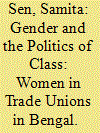

|
|
|
|
|
| Summary/Abstract |
The essay examines women’s political participation at the intersection of the labour, nationalist and women’s movements in Bengal. The focus is on women labour activists from the 1920s to the 1970s, mostly from the middle classes but also drawing on the example of two working-class women leaders. Scholarship on the subject has so far either deplored women’s marginality in labour movements or celebrated their participation. Moving beyond such dichotomies, this paper explores women’s activism in unions to address three issues: the nature of women’s engagement with labour politics; their negotiations with their own family and the social limits of gendered behaviour; and their response to the political mainstreaming of trade unions in India.
|
|
|
|
|
|
|
|
|
|
|
|
|
|
|
|
| 3 |
ID:
178861
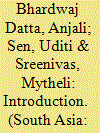

|
|
|
|
|
| Summary/Abstract |
This Introduction frames a collection of papers that explore the roles played by women—as volunteers, organisers, bureaucrats, politicians and citizens—in shaping the emerging ideologies and structures of independent India. Although women’s participation is both understudied and inadequately theorised in existing scholarship, the papers in this collection demonstrate that the decades following India’s Independence witnessed the participation of women in every sphere of politics and nation-building. The introductory essay tracks the limits and possibilities of women’s agency and gendered citizenship in these spheres to historicise the women’s movement during the post-Independence decades, and to examine its fraught relationship with feminism, patriarchal society and state politics.
|
|
|
|
|
|
|
|
|
|
|
|
|
|
|
|
| 4 |
ID:
178864
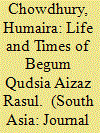

|
|
|
|
|
| Summary/Abstract |
This paper examines the life and times of a remarkable twentieth-century figure, Begum Qudsia Aizaz Rasul (1908–2001), the first and only Muslim woman in independent India’s Constituent Assembly which drafted the country’s Constitution. In doing so, it critically engages with the genre of autobiographical writing—the limits it imposed and the particular vantage points it offered. By drawing upon Begum Rasul’s private papers, her autobiography and her speeches in the Constituent Assembly debates from 1946 to 1950, this paper unpacks the ways in which she sought to negotiate her multiple and intersecting identities of class, gender and religious background. Her acts of self-fashioning provide critical insights into how Muslim women negotiated their identities in post-colonial India often in resistance to, and conformity with, the national status quo.
|
|
|
|
|
|
|
|
|
|
|
|
|
|
|
|
| 5 |
ID:
178865
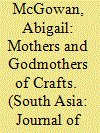

|
|
|
|
|
| Summary/Abstract |
Among the many nation-building projects launched soon after India’s Independence, crafts had a prominent role as a key way to support Indian culture, encourage diverse Indian production and build rural employment. These new efforts in crafts reveal the leadership of a group of powerful women, including most prominently Kamaladevi Chattopadhyay and Pupul Jayakar. Together, Chattopadhyay, Jayakar and others helped forge the idea of India as a crafts nation even as they made possible new roles for women within the fields of crafts. Powerful women operating in areas formerly dominated by men, they helped to shape the vision of crafts in the new state but faced important limits, revealing the narrow space for female leadership after Independence.
|
|
|
|
|
|
|
|
|
|
|
|
|
|
|
|
| 6 |
ID:
178871
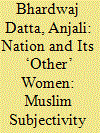

|
|
|
|
|
| Summary/Abstract |
Partition produced newer anxieties for Delhi’s Muslims as they became subject to the everyday violence of both state and society, exacerbated by the rise of Hindu nationalism and the organised demarcation of Muslim-dominated areas as ‘exclusionary’ and ‘contested’ zones. While the city was fraught with violent conflicts and exclusionary politics, gender was also being redefined and renegotiated. This article will query the particular lived experience and embodied agency of Muslim women in order to study gender and space within the context of social, cultural, economic and political changes after Partition. It will explore the ways in which women exercised agency and claimed space and belonging in everyday negotiations and strategies for survival, thereby contributing to family income and small capitalism in the Old City. It will study their diverse experiences which were shaped by their social location and challenged by the political, religious, economic and social processes that impinged upon their lives. Rather than seeing them as passive subjects of history, it foregrounds Muslim women’s navigation of state, community and the household in independent India.
|
|
|
|
|
|
|
|
|
|
|
|
|
|
|
|
| 7 |
ID:
178866
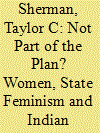

|
|
|
|
|
| Summary/Abstract |
The 1950s are often derided in the scholarship as a period of welfarist policies which reinforced women’s role in the family and entrenched women’s economic dependence. This paper examines the Central Social Welfare Board, and in particular its Welfare Extension Projects, to provide a new characterisation of the approach to women’s issues during the period. It argues that the Central Social Welfare Board, with its unique administrative structure, its preference for voluntary activity, and its adherence to persuasion as a mode of action reflected many of the characteristics of Indian socialism of the time. It also sketches, from this angle, a partial picture of state feminism in India. In the Central Social Welfare Board, state feminism was concerned with the gradual transformation of women and a radical, if short-lived, makeover of the state.
|
|
|
|
|
|
|
|
|
|
|
|
|
|
|
|
| 8 |
ID:
178860
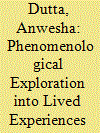

|
|
|
|
|
| Summary/Abstract |
The Bodoland Territorial Autonomous Districts (BTAD) in the state of Assam in Northeast India can be described as a landscape of terror since the area has been a stage for recurrent, mostly violent contestations along ethno-religious lines for more than four decades. Over the years, the violence has claimed more than a thousand lives and displaced millions. Using a multi-sited ethnography carried out over more than eleven months of fieldwork in the region, this paper looks at the everyday lives of those affected by the conflict and critiques the notion of spectacular resistance and exceptionalism in the context of Northeast India. This is done by using a phenomenology of lived experience framework to pay closer attention to the distinctly ordinary ways in which populations survive and endure states of dispossession, displacement and abandonment.
|
|
|
|
|
|
|
|
|
|
|
|
|
|
|
|
| 9 |
ID:
178868
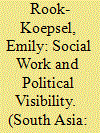

|
|
|
|
|
| Summary/Abstract |
This article considers social service work as a vector from which elite and middle-class Indian women claimed gendered citizenship during the 1940s and 1950s. The article highlights the ways in which these women emphasised social service work as a way to create visibility for themselves, while obscuring the labour of other women whom they claimed as clients. The article also traces the professionalisation of social work through the 1950s, a move which undermined these women’s claims to representative power and political visibility based on their social work.
|
|
|
|
|
|
|
|
|
|
|
|
|
|
|
|
| 10 |
ID:
178869


|
|
|
|
|
| Summary/Abstract |
In the aftermath of Partition, the Government of India suddenly found itself to be responsible for a large number of refugee women who were not ‘attached’ to male guardians. The national government readily acknowledged the fate of these widowed, abandoned or abducted women as a sphere of feminine expertise and sought the active participation of prominent social workers such as Rameshwari Nehru, Mridula Sarabhai, Ashoka Gupta and Romola Sinha. Referred to as ‘lady social workers’, these women worked as volunteers and advisors to rehabilitate unattached women. Focusing on the voluntary service of social workers in West Bengal, and drawing upon the memoirs and personal papers of Ashoka Gupta, this article seeks to understand the limits and possibilities of this role. Was their role entirely circumscribed by the larger patriarchal vision of rehabilitation that treated ‘unattached’ refugee women as permanent liabilities of the state, or could they author policy that benefitted refugee women? Through a close reading of the solutions, schemes and reforms proposed by lady social workers, this paper suggests a complex relationship that resists such binaries.
|
|
|
|
|
|
|
|
|
|
|
|
|
|
|
|
| 11 |
ID:
178862


|
|
|
|
|
| Summary/Abstract |
Indian leaders and women’s organisations wanted to ensure that women would participate in and be elected to the legislatures in India’s first elections. Ultimately, however, only a small number of women were selected as candidates, and even fewer were elected to the legislatures. This article explores some of the mechanisms and ways in which this gap emerged in relation to the registration, representation and participation of women in the run-up to and during India’s first elections. In pursuing these three lines of inquiry, the article aims to shed light on the ways in which women related to and appropriated the notion of popular authorisation of the government, and what was their role, in this regard, in democratic state-building during the early days of the republic.
|
|
|
|
|
|
|
|
|
|
|
|
|
|
|
|
| 12 |
ID:
178863
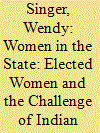

|
|
|
|
|
| Summary/Abstract |
When Parvathi Krishnan (MP, Coimbatore Madras) entered India’s parliament on 28 March 1958, it was just a regular workday. She questioned a government minister about his policies toward railway workers, and solicited funds to repair a post office in her constituency. And yet as a woman legislator, she balanced the everyday tasks of governance with the difficulties of functioning in a male-centred institution. This essay, based on research in legislative debates in Madras and Bihar as well as in parliament, argues that especially for the period from 1957 to 1962, when so much of the legislative process was still in flux, women legislators challenged government structures even as they participated in making them. Their work—for the state and for their constituents—necessarily shaped the institutions to which they were elected. Looking beyond high-profile policies like the Five-Year Plans, this essay reveals the complex task of governing and the critical roles of women in it.
|
|
|
|
|
|
|
|
|
|
|
|
|
|
|
|
|
|
|
|
|